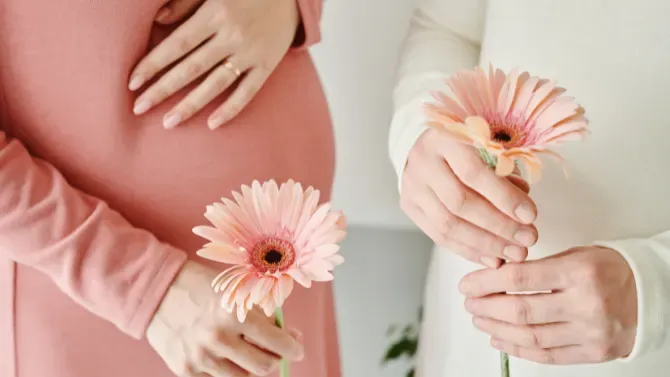The pregnant woman's diet
Healthy Food For Pregnant Woman. A pregnant woman needs a diet adapted
to her new needs and her future baby. It will take on average between 9 and 12
kilos divided between the weight of the newborn (3 and 4 kilos), the placenta
and other annexes and the reserve of fat essential at the time of
breastfeeding. However, if she has to eat for two, she should not eat
twice as much, but twice as well. A well-balanced diet will allow him to
prevent possible complications related to the pregnancy and the health
problems of her future child.
Healthy Diet For A Pregnant Woman

The overall number of calories needed For pregnant woman's diet
During the first trimester of pregnancy, a woman will need an additional 150 kcal per day and 350 during the following two trimesters. These averages must take into account his physical activity and various individual factors. But if his energy intake is less than 1500 kcal during the last five months, this can have deleterious consequences on the growth of the fetus.Protein Food For Pregnant Woman
Dietary Needs Of A Pregnant Woman. Protein intake is estimated at 70 grams
per day. Fish consumption is particularly recommended; this food contains a
large quantity of iodine (essential for the proper development of the baby's
brain), selenium, vitamin D, vitamin B12 and omega 3; However, river fish
should be avoided because of their mercury concentration. Vegan diets should
be avoided, as they exclude any food of animal origin, which is essential
for the baby's proper development. It is indeed necessary to combine animal
origin and vegetable origin proteins, in particular with legumes.
Pregnant Lady Food - Carbohydrates
Pregnancy profoundly alters carbohydrate metabolism. In addition, glucose
plays a vital role in fetal tissues. Slow sugars should be favoured, and their
intake distributed throughout the day. Breakfast should make them a place of
choice to avoid hypoglycaemia resulting from nocturnal fasting. Ideally, it
should provide 50 grams of starch, 80 grams of bread or 60 grams of plain
cereal. Whole grains are more interesting than refined ones because of their
more extraordinary richness in nutrients, vitamins and trace elements.
Lipids in pregnant woman's diet
In terms of lipids, it is essential to ensure that you have a good supply of essential fatty acids. These are essential for the proper development of the nervous tissues of the future newborn. Between 15 to 30 ml of various oils are recommended per day. Rapeseed oil is absorbing because of its quantity of omega 3, as is linseed oil, but to diversify its nutrient intake, 4-oil blends are also recommended. It is also necessary to consume oily fish, which contain omega three and oilseeds.Pregnant Lady Diet elements
Pregnant women generally suffer from a calcium deficiency, the daily requirement of which increases by 1200 mg. Calcium is essential for bone mineralization in the fetus; it helps enrich breast milk. In addition, calcium protects the mother from the risk of high blood pressure and eclampsia attacks. Four daily dairy products are thus recommended, whether milk, yoghurt or cheese.
In addition to calcium, you must have an adequate intake of vitamin D, which
allows the good assimilation of calcium by the body; however, vitamin D
deficiency is widespread in the population, which generally requires
supplementation, especially in winter. It is found in eggs, fatty fish, salmon
and sardines, and dairy products. Do not neglect exposure to the sun, which
allows the body to synthesize it.
Iron intake also increases sharply during pregnancy, reaching between 30 to 50 mg per day. It is not uncommon for pregnant women to be anaemic, which increases the risk of premature birth and low birth weight of the newborn. Here too, dietary supplements are generally prescribed. Eggs, red meat, black pudding, fish, pulses (white beans, lentils, chickpeas, etc.) are iron-rich foods. Vitamin C, which is found in particular in citrus fruits and broccoli, allows better assimilation of iron.
Iron intake also increases sharply during pregnancy, reaching between 30 to 50 mg per day. It is not uncommon for pregnant women to be anaemic, which increases the risk of premature birth and low birth weight of the newborn. Here too, dietary supplements are generally prescribed. Eggs, red meat, black pudding, fish, pulses (white beans, lentils, chickpeas, etc.) are iron-rich foods. Vitamin C, which is found in particular in citrus fruits and broccoli, allows better assimilation of iron.

Water For Pregnant Lady Diet
It is advisable to limit your consumption of tea and coffee during this
period. About two litres of water a day are necessary for a pregnant woman,
and this good hydration allows avoid constipation and urinary tract
infections. This vital contribution must be maintained after the birth,
particularly in the event of breastfeeding a baby. Pregnant women can favor
mineral waters rich in calcium to increase their intake.
Pregnant Woman Eating
Pregnant Woman Should Eat. Food must be diversified,
healthy and balanced, and all deprivation must be banned; on the
other hand, it is necessary to respect his desires and dislikes. Due to
frequent nausea and vomiting in the first trimester, it is recommended to
multiply meals to split food intake and spread it throughout the day. It is
essential to be regularly followed by a doctor during this period, to
respect his recommendations, and not start a diet on his initiative.
Read More:
Post a Comment